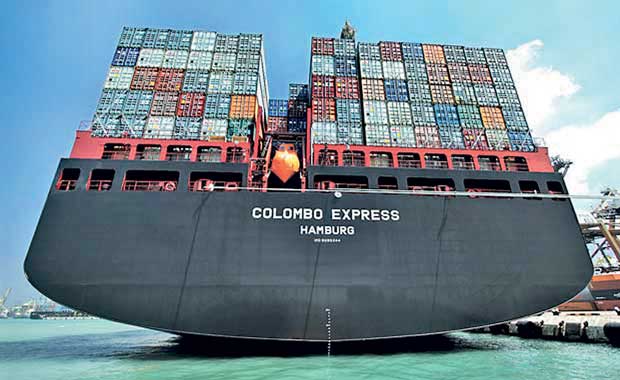Reply To:
Name - Reply Comment

 In a global economy, no country can feed itself without going for imports and exports, being engaged in international trade. Each and every nation, having identified its comparative advantages, produces and exports what they can and imports and consumes what they cannot. Here, the least developed and developing countries in the world have to experience severe hardships in the struggle to have an access to developed countries with larger markets and especially to beat the competition with their regional counterparts. It was as a remedy to this that the General System of Preferences (GSP) was introduced in 1968 by the General Agreement on Trade and Tariffs (GATT).
In a global economy, no country can feed itself without going for imports and exports, being engaged in international trade. Each and every nation, having identified its comparative advantages, produces and exports what they can and imports and consumes what they cannot. Here, the least developed and developing countries in the world have to experience severe hardships in the struggle to have an access to developed countries with larger markets and especially to beat the competition with their regional counterparts. It was as a remedy to this that the General System of Preferences (GSP) was introduced in 1968 by the General Agreement on Trade and Tariffs (GATT).
Sri Lanka was offered GSP Plus in 2005 paving the way for exporting Sri Lankan products coming from the industries of textiles and fisheries, the exports of which were stagnant or underperforming, once the concession was temporarily suspended in 2010, mainly due to the non-adhering to the international conventions, especially human rights. Fortunately, it was regained by Sri Lanka under the present government that seems to be following a balanced foreign policy, making a hot topic among the business community and even the public. However, some questions have to be raised as to what’s next because there are more areas that require the immediate attention of the government and private sector.
Achievement
It is needless to say that regaining GSP Plus is a plus for the Sri Lankan economy, particularly at a time when it is struggling with poor export performance. It is with export-oriented economic strategies that economic growth and development can be achieved for any country in the world. Foreign inflows are a must for increasing the reserve and making the rupee strong.
Furthermore, what is most important is that the country was regranted with the concession when the European Union (EU) countries have gradually recovered from the economic crisis in 2009, substantially raising the purchasing power of people in the region, which hopefully creates a huge demand for Sri Lankan products. In the South Asian region, only Sri Lanka other than Pakistan is a beneficiary of the GSP Plus concession; it is a competitive advantage because Sri Lanka can export textiles to the EU more competitively than Bangladesh does, being a centre of the apparel industry.
Temporary solution
Undoubtedly, as long as Sri Lanka adheres to the international conventions covering human rights, good governance and environmental protection so and so forth, the country will be able to enjoy the concession. However, what has to be kept in mind is that concessions are given as a helping hand. Once we stand up, we are no longer eligible for that. The same will be applied for GSP Plus as well.
Sri Lanka will lose this concession once it graduates to the upper-middle-income level, which is expected to be achieved immediately. Our export sector must be prepared for taking up the challenge of sailing alone on the rough sea. This cannot be done by exporting very traditional export items, which will lose their comparative as well as competitive advantages in the near future. If we are to move forward, we will have to relinquish relief-dependent mentality.
Capacity expansion
To capitalize on the possible high demand in the European market, which offers duty free access for Sri Lankan export items, we, as a country, have to expand our export capacity, which will push the supply curve outward. It is true that supply expansion cannot be done overnight, especially in an environment where certain suppliers in the small and medium enterprise (SME) sector had given up their exports, mainly due to the inability to compete in the global market without GSP Plus.
The Export Development Board (EDB) has a great role to play in this respect. In my opinion, one of the problems which the SME exporters have to face at the beginning is that how they find out a possible buyer in the foreign market who can be trusted by the supplier. Actually, this is where the EDB intervention is required for supporting the SME exporters to find out a safe buyer. This coordination will be very instrumental to attract new suppliers for exporting goods to the EU market.
When it comes to well-established large companies engaged in exports, they can do it well, as they have sufficient capital and other resources to expand aggressively and supply extensively. However, the SME exporters find it very difficult for financing for the capacity expansion. That is why the banks should be encouraged to lend for emerging small entrepreneurs who mainly focus on the export market.
Brexit
It is known that the UK will officially leave the EU in 2019, having some economic impacts on the Sri Lankan economy, as Sri Lanka enjoyed the concession, when it was with the EU. Approximately 80 percent of the total exports to the EU were to the UK. Hence, Brexit will undoubtedly undervalue the importance of regaining GSP Plus because we are no longer capable of exporting to the UK under the GSP Plus concession. This is why the emphasis has to be given to sign at least a bilateral trade agreement, which benefits both the countries and allows us to have an access to that market as well.
The next
While it has to be recognized that the European market is a market with a large consumer base for Sri Lankan products and extremely important for creating an export-oriented economy, which seems to be more sustainable at present, we don’t have to forget the other markets such as the countries in the Latin American and Southeast Asian regions. Prime Minister Ranil Wickramasinghe, addressing the Belt and Road forum in China, stated that the FTA with India is being deepened. Sri Lanka is also negotiating FTAs with China and Singapore. This can be considered a commendable move, for the country cannot be satisfied with regaining GSP Plus only.
It doesn’t matter how many FTAs the country signs. If we still focus on the traditional items, we are unable to move forward. As long as we export the primary items, which are used for making further productions, we cannot claim for the real value of any FTA or GSP Plus.
(Amila Muthukutti is an economist who has widely published covering the areas of economics and business management)